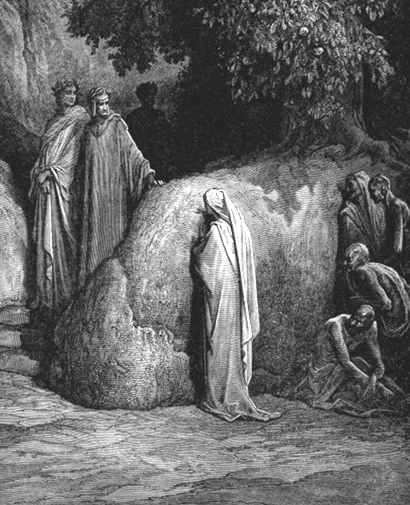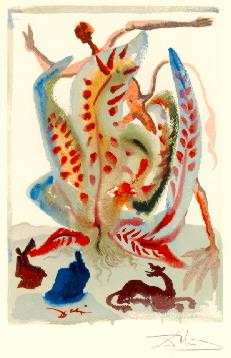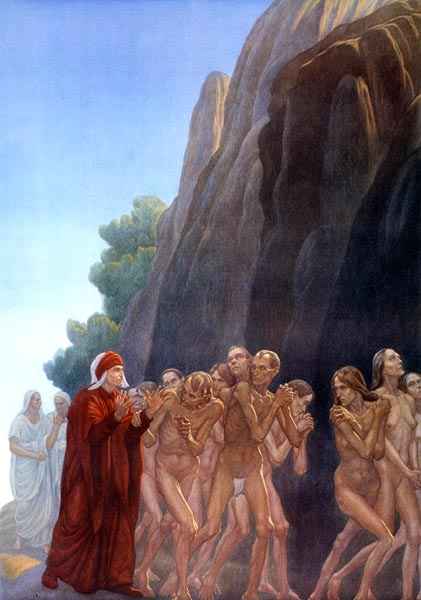 |
 |
 |
|
|
|
|
 |
 |
 |
|
|
|
|
| PURG23 |
|
|
|
|
| ........... | ....... G.GUAITA |
................................. H.W.LONGFELLOW |
...... .D.ALIGHIERI |
....... ... | ....... |
| 1
|
Méntre
che
i
öc'
andrénta
al vërd di fòji puntàva mi mè cul l'è sòlit fè, che 'l pàsa 'l témp andànd près a i üzéj, |
The
while among the verdant leaves mine eyes I riveted, as he is wont to do Who wastes his life pursuing little birds, My more than
Father said
unto me: "Son, I turned my face
and no less
soon my steps |
Mentre
che
li
occhi
per la fronda verde ficcava io sì come far suole chi dietro a li uccellin sua vita perde, |
| 4
|
al
pü
che
pàri
'm
dis:" Car al mè fiö, andùma, vén, che 'l témp che 'n rèsta ancù üzèlu pü ütilmént 'n cunvén adès". |
lo
più che
padre mi dicea: «Figliuole, vienne oramai, ché 'l tempo che n'è imposto più utilmente compartir si vuole». |
|
| 7
|
Mi
i
gir
la
fàcia
e, tirànd fòra 'l pas vad après cuj sapiént che tra 'd lur parlàvu, tant che l'andè am favu nen peizè. |
Io volsi
'l viso,
e 'l passo non men tosto, appresso i savi, che parlavan sìe, che l'andar mi facean di nullo costo. |
|
| 10
|
Ma
'n
tant,
piànzi
e
cantè adès santìva: "'Labia mea, Domine' ant' na manéra che 'n pò piazì e dulùr ansèma l'éra. |
And
lo! were heard a song and a lament, "Labia mea, Domine," in fashion Such that delight and dolence it brought forth. "O my sweet
Father, what
is this I hear?" In the same way
that thoughtful
pilgrims do, |
Ed ecco
piangere
e cantar s'udìe 'Labia mea, Domine' per modo tal, che diletto e doglia parturìe. |
| 13
|
"O
mè
car
pàri,
che
ca l'è che i sént?", iù cumincià; e lü:"Ombri che i van i débit so , mi i crëd, pürificànd". |
«O
dolce padre,
che è quel ch'i' odo?», comincia' io; ed elli: «Ombre che vanno forse di lor dover solvendo il nodo». |
|
| 16
|
Mè
i
fan
i
pelegrìn
che ién an màrcia, quànd , rivà 'n mìra a gént nén cunusüa, as gìru par vardè sénsa farmèsi, |
Sì
come i
peregrin pensosi fanno, giugnendo per cammin gente non nota, che si volgono ad essa e non restanno, |
|
| 19
|
cuzì,
rivànd
daréra,
e
andànd
pü fort, pasàvu a nuj davànti e 'n vardàvu cùli ànimi devòti e silenziùzi. |
Even
thus, behind us with a swifter motion Coming and passing onward, gazed upon us A crowd of spirits silent and devout. Each in his eyes
was dark
and cavernous, I do not think
that so to
merest rind |
così di retro
a noi, più tosto mota, venendo e trapassando ci ammirava d'anime turba tacita e devota. |
| 22
|
A
iàvu
i
öc'
cuzì
scavà a fond, na fàcia zmòrta e 'n pü, di na magrësa, che sut la pèl sa vdìvu mèche i os. |
Ne li
occhi era ciascuna
oscura e cava, palida ne la faccia, e tanto scema, che da l'ossa la pelle s'informava. |
|
| 25
|
Crëd
nén
ch'Erisitòn
cuzì
vnì
sëc 'l füisa cun nànca 'n poc ad carn adòs, par al digiün quànd lü pü fam l'è avü'. |
Non credo
che così
a buccia strema Erisittone fosse fatto secco, per digiunar, quando più n'ebbe tema. |
|
| 28
|
Tra
'd
mi
pensànd
dizìva:"Vàrda
la gént che l'è stàta asedià 'n Gerüzalèm, quànd Marìa antal fiö l'ha druvà i dént". |
Thinking
within myself I said: "Behold, This is the folk who lost Jerusalem, When Mary made a prey of her own son." Their sockets
were like rings
without the gems; Who would believe
the odour
of an apple, |
Io dicea
fra me stesso
pensando: 'Ecco la gente che perdé Ierusalemme, quando Maria nel figlio diè di becco!' |
| 31
|
Mè
anéj
sénsa
giòji
a
iàvu i öc'; e chi, 'ntla fàcia di òmni, 'òmu' al lég', chi, l' èmme, lu ligìva ancù pü bén. |
Parean
l'occhiaie
anella sanza gemme: chi nel viso de li uomini legge 'omo' ben avria quivi conosciuta l'emme. |
|
| 34
|
Chi
'l
crëdarìa
che
di
'n pum l'udùr e dl'àqua, an lur fazéisa 'n tal efèt, sénsa cunòsi 'l misteriùs segrét? |
Chi
crederebbe che
l'odor d'un pomo sì governasse, generando brama, e quel d'un'acqua, non sappiendo como? |
|
| 37
|
Mi
'm
ciamàva:"Da
'ndùa
vén
sa fam?", parchè la càuza mi, 'ncù nén i sàva che i füisu cuzì màgar e stirà, |
I
still was wondering what so famished them, For the occasion not yet manifest Of their emaciation and sad squalor; And lo! from out
the hollow
of his head Never should I
have known
him by his look; |
Già era in
ammirar che sì li affama, per la cagione ancor non manifesta di lor magrezza e di lor trista squama, |
| 40
|
pö,
iün
che
dal
prufònd
a dla so tèsta, am pònta i öc' adòs e 'm vàrda fis, 's büta criè:"Che gràsia a l'è maj cùsta?". |
ed ecco
del profondo
de la testa volse a me li occhi un'ombra e guardò fiso; poi gridò forte: «Qual grazia m'è questa?». |
|
| 43
|
Maj
la
fàcia
i
avrìa
cunusü'; ma la so vus l'ha fat che mi ia vdéisa, lònche l'aspèt a l'àva tnì scundü'. |
Mai non
l'avrei riconosciuto
al viso; ma ne la voce sua mi fu palese ciò che l'aspetto in sé avea conquiso. |
|
| 46
|
Mè
na
falòspa,
sübit
l'ha
viscàmi la cunusénsa dl'om cuzì cambià; l'amìs i ricunòs, a l'è 'l Foréze! |
This
spark within me wholly re-enkindled My recognition of his altered face, And I recalled the features of Forese. "Ah, do not look
at this
dry leprosy," But tell me truth
of thee,
and who are those |
Questa
favilla tutta
mi raccese mia conoscenza a la cangiata labbia, e ravvisai la faccia di Forese. |
| 49
|
"Deh,
fìsmi
nén
la
pèl
che la va 'n scàji, e 'm gàva ànche 'l culùr dla carnagiòn, e cèrca nén la carn che iàvu 'ndòs; |
«Deh, non contendere
a l'asciutta scabbia che mi scolora», pregava, «la pelle, né a difetto di carne ch'io abbia; |
|
| 52
|
ma
dìmi
'l
vér
ad
ti e chi ién cùli dùi ànimi che i fan a ti da scòrta; rèsta nén lì, mi 't prég, sénsa paròli": |
ma dimmi
il ver di
te, di' chi son quelle due anime che là ti fanno scorta; non rimaner che tu non mi favelle!». |
|
| 55
|
"A
vëdi
la
to
fàcia
quànd t'è mort, mi iù pianzì, tant gros l'éra 'l dulùr; ma a vëdla dès cuzì, l'è 'ncù magiùr. |
"That
face of thine, which dead I once bewept, Gives me for weeping now no lesser grief," I answered him, "beholding it so changed! But tell me, for
God's sake,
what thus denudes you? And he to me:
"From the eternal
council |
«La
faccia
tua, ch'io lagrimai già morta, mi dà di pianger mo non minor doglia», rispuos'io lui, «veggendola sì torta. |
| 58
|
Che
l'è,
prìma
ti
dìmi,
che 'v cunsüma; fàmi nén cun as dübi 'ndrén parlè, che mal pöl fèlu iün s'ià n àut pensé". |
Però mi dì,
per Dio, che sì vi sfoglia; non mi far dir mentr'io mi maraviglio, ché mal può dir chi è pien d'altra voglia». |
|
| 61
|
E
lü:"Dal
cél
ca
piöva
l'è decìs na virtü' 'ndrénta l'àqua e 'ndrén la piànta, rastà dès andaré, che na zmagrìs. |
Ed elli a
me: «De
l'etterno consiglio cade vertù ne l'acqua e ne la pianta rimasa dietro ond'io sì m'assottiglio. |
|
| 64
|
Sa
gént,
ti
't
vëdi,
che pianzénd la cànta, l'è 'ndài près la gùla ùltre mzüra; e dès , par fam e séj, divénta sànta. |
All
of this people who lamenting sing, For following beyond measure appetite In hunger and thirst are here re-sanctified. Desire to eat and
drink enkindles
in us And not a single
time alone,
this ground |
Tutta
esta gente
che piangendo canta per seguitar la gola oltra misura, in fame e 'n sete qui si rifà santa. |
| 67
|
Dal
béjvi
e
dal
mangè
al dezidéri an vìsca l'udùr di pum e ànche dl'àqua che 'nsi fòji ia vdùma sémp caschè. |
Di bere e
di mangiar
n'accende cura l'odor ch'esce del pomo e de lo sprazzo che si distende su per sua verdura. |
|
| 70
|
E
nén
mèc
na
vòlta
par sa curnìs, girànd antùrn, s'arnòva nòsa pén'a; nén pén'a duvrìa dì, pütost piazì; |
E non pur
una volta,
questo spazzo girando, si rinfresca nostra pena: io dico pena, e dovrìa dir sollazzo, |
|
| 73
|
che
cùla
stèsa
vòja
an
mén'a al piànti che Crìstu l'ha guidà a dì 'Elì', quànd Lü l'ha dat al sang par riscatèni". |
For
the same wish doth lead us to the tree Which led the Christ rejoicing to say 'Eli,' When with his veins he liberated us." And I to him:
"Forese, from
that day If sooner were
the power
exhausted in thee |
ché
quella voglia
a li alberi ci mena che menò Cristo lieto a dire 'Elì', quando ne liberò con la sua vena». |
| 76
|
E
mi
a
lü:"Foréze,
se
dal témp che ti a t'è pasà a migliùr vìta, 'ncù nén sinc àni a ién pasà fin chi, |
E io a
lui: «Forese,
da quel dì nel qual mutasti mondo a miglior vita, cinq'anni non son vòlti infino a qui. |
|
| 79
|
spiégmi:
se
'n
ti
la
vòja 'd fè pecà l'è finì prìma che i rivéisa l'ùra ad cul dulùr che 'd Dìu an dà 'l pardòn, |
Se prima
fu la possa
in te finita di peccar più, che sovvenisse l'ora del buon dolor ch'a Dio ne rimarita, |
|
| 82
|
mè
l'è
che
ti,
chi
sü, t'è già rivà? Mi i cardìva 'd truvèti giü da sùta, andùa témp cun témp l'è ripagà". |
How
hast thou come up hitherward already? I thought to find thee down there underneath, Where time for time doth restitution make." And he to me:
"Thus speedily
has led me She with her
prayers devout
and with her sighs |
come se'
tu qua sù
venuto ancora? Io ti credea trovar là giù di sotto dove tempo per tempo si ristora». |
| 85
|
E
lü
a
mi:"Pü
prëstu
chi l'ha mnàmi a béjvi 'l dus e màru 'd si turmént la mè Nèlla che l'ha pregà ma tant. |
Ond'elli
a me: «Sì
tosto m'ha condotto a ber lo dolce assenzo d'i martìri la Nella mia con suo pianger dirotto. |
|
| 88
|
Cun
preghiéri
devòti
e
i
so suspìr l'ha gavàmi dla rìva 'ndùa sa spèta, e liberàmi ànche di àuti gir. |
Con suoi
prieghi
devoti e con sospiri tratto m'ha de la costa ove s'aspetta, e liberato m'ha de li altri giri. |
|
| 91
|
Pü
càra
a
Dìu
la
me dòna l'è, pòvra vìdua,( oh s' iù vulìji bén) parchè d' unèsti, ni è pòchi tam mè lé; |
So
much more dear and pleasing is to God My little widow, whom so much I loved, As in good works she is the more alone; For the Barbagia
of Sardinia O brother sweet,
what wilt
thou have me say? |
Tanto
è a
Dio più cara e più diletta la vedovella mia, che molto amai, quanto in bene operare è più soletta; |
| 94
|
la
Barbàgia
'd
Sardégna,
dòni
ià ch' ién püsè bràvi e virtüùzi ancù 'd cùla Barbàgia 'ndùa l'è rastà. |
ché la Barbagia
di Sardigna assai ne le femmine sue più è pudica che la Barbagia dov'io la lasciai. |
|
| 97
|
O
car
fratèl,
che
't
völi che mi 't dìza? Pasrà nén tàntu témp, mi già lu vëd, e da 's mumént l'è già nén tant distànt, |
O dolce
frate, che
vuo' tu ch'io dica? Tempo futuro m'è già nel cospetto, cui non sarà quest'ora molto antica, |
|
| 100
|
che
ciàr
sarà
dal
pülpit
interdèt a cùli poc ad bon ad fiurentìn'i, andè mustrànd i tëti a stòmi scuèrt. |
When
from the pulpit shall be interdicted To the unblushing womankind of Florence To go about displaying breast and paps. What savages were
e'er, what
Saracens, But if the
shameless women
were assured |
nel qual
sarà
in pergamo interdetto a le sfacciate donne fiorentine l'andar mostrando con le poppe il petto. |
| 103
|
Quàj
dòni
e
'd
quàj
bàrbara cuntrà, iàn maj avì da bzogn parchè 's cuarcéisu, d'urdinasiòn ad vëscu o 'd pudestà? |
Quai barbare
fuor mai, quai
saracine, cui bisognasse, per farle ir coperte, o spiritali o altre discipline? |
|
| 106
|
Ma
se
si
plàndri,
lònche
'n cél 's prepàra i cunuséisu adès e 'l mal che i tùca, già par criè i durvrìu lur la bùca; |
Ma se le
svergognate
fosser certe di quel che 'l ciel veloce loro ammanna, già per urlare avrian le bocche aperte; |
|
| 109
|
e
se
'l
mè
'ntivëdi
nén m'ingàna, prìma saràn pünìi che la bàrba i àbia , chi dès , l'ha bzogn dla nìna nàna. |
For
if my foresight here deceive me not, They shall be sad ere he has bearded cheeks Who now is hushed to sleep with lullaby. O brother, now no
longer
hide thee from me; Whence I to him:
"If thou
bring back to mind |
ché se l'antiveder
qui non m'inganna, prima fien triste che le guance impeli colui che mo si consola con nanna. |
| 112
|
Oh
,
dès,
amìs
ténti
pü nén scundü'; nén mèc, at vëdi mi, ma ànche sa gént la vàrda là 'ndùa ti ta scòndi 'l sul". |
Deh,
frate, or fa
che più non mi ti celi! vedi che non pur io, ma questa gente tutta rimira là dove 'l sol veli». |
|
| 115
|
Alùra
mi:"Se
ti
tat
fè
vnì 'n mént mè iùma cumpurtàsi iün cun l'àut, al péiza al ricurdè ancù al prezént. |
Per ch'io
a lui:
«Se tu riduci a mente qual fosti meco, e qual io teco fui, ancor fia grave il memorar presente. |
|
| 118
|
Da
cùla
vìta
l'ha
salvàmi
cust, che chi davànti am va, l'àut iér,quànd pién'a a l'éra la surèla 'd cul là sü; |
Out
of that life he turned me back who goes In front of me, two days agone when round The sister of him yonder showed herself," And to the sun I
pointed.
"Through the deep Thence his
encouragements
have led me up, |
Di quella
vita mi
volse costui che mi va innanzi, l'altr'ier, quando tonda vi si mostrò la suora di colui», |
| 121
|
-
e
i
mustràva
'l
sul - lü l'ha mnàmi sprès par la prufònda nöt ad cuj ch'ién mort cun sa véra carn che 'm tir après. |
e 'l sol
mostrai;
«costui per la profonda notte menato m'ha d'i veri morti con questa vera carne che 'l seconda. |
|
| 124
|
Pö
dès
m'asìst
cun
tüti
i so cunfòrt, girànd e muntànd sü par la muntàgna che 'rdrìsa vuj che al mond a iéri stort. |
Indi
m'han tratto
sù li suoi conforti, salendo e rigirando la montagna che drizza voi che 'l mondo fece torti. |
|
| 127
|
L'ha
dìmi
che
'd
guidèmi
al lasrà pü, fin quànd i riv a vëdi Beatrìs; e alùra i rastrù sul, mi, sénsa 'd lü. |
He
says that he will bear me company, Till I shall be where Beatrice will be; There it behoves me to remain without him. This is
Virgilius, who thus
says to me," Your realm, that from itself discharges him." |
Tanto
dice di farmi
sua compagna, che io sarò là dove fia Beatrice; quivi convien che sanza lui rimagna. |
| 130
|
Virgìlio
l'è
cust
che
'm
prumët cuzì, - e iù mustràilu - e cùsta l'è cul'òmbra, che fort l'ha fat tarmè, poc fa 'l vos rëgn, |
Virgilio
è
questi che così mi dice», e addita'lo; «e quest'altro è quell'ombra per cui scosse dianzi ogne pendice |
|
| 133 | al mont che giüst adès da lü lu zgòmbra". | lo vostro regno, che da sé lo sgombra». |